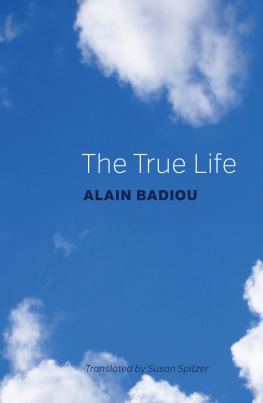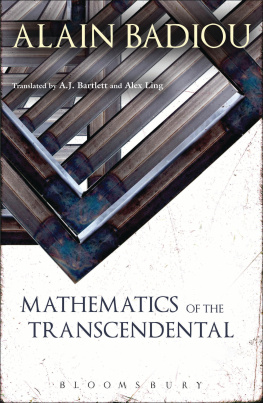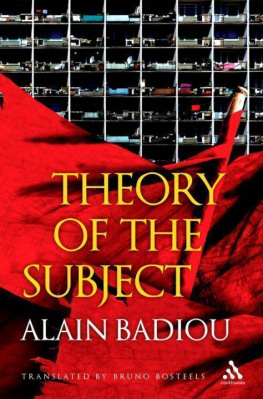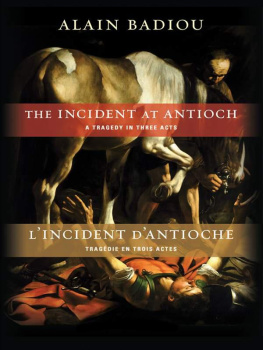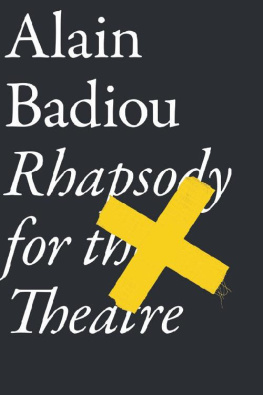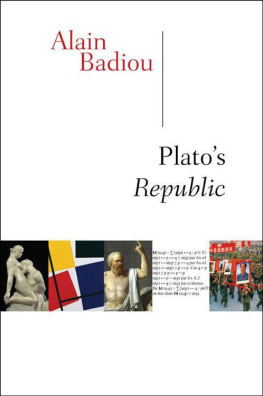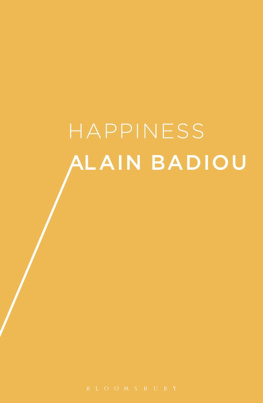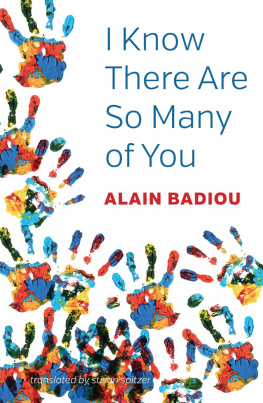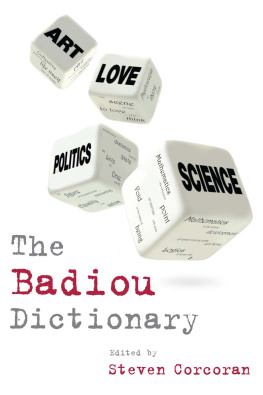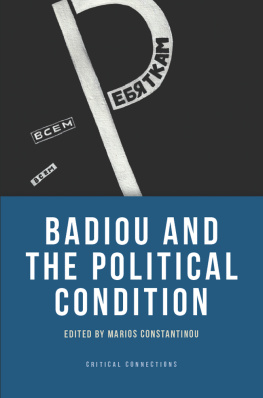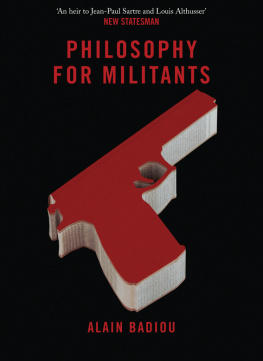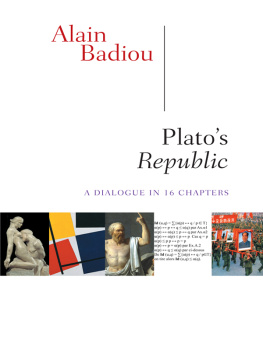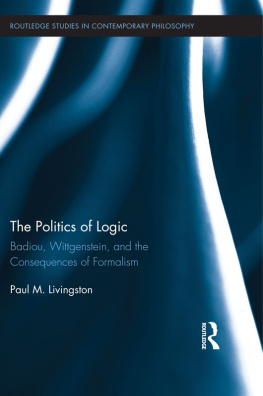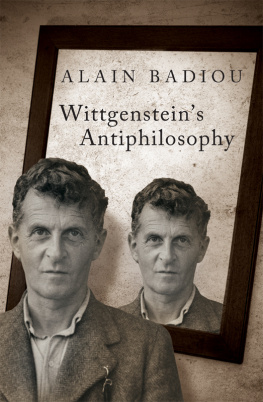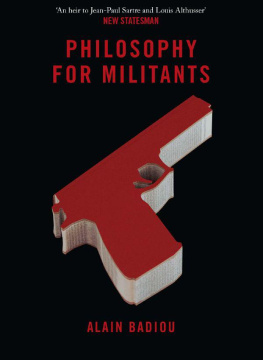Contents
Guide
Pages

The True Life
Alain Badiou
Translated by Susan Spitzer
polity
First published in French as La vraie vie Librairie Arthme Fayard, 2016
This English edition Polity Press, 2017
Polity Press
65 Bridge Street
Cambridge CB2 1UR, UK
Polity Press
350 Main Street
Malden, MA 02148, USA
All rights reserved. Except for the quotation of short passages for the purpose of criticism and review, no part of this publication may be reproduced, stored in a retrieval system or transmitted, in any form or by any means, electronic, mechanical, photocopying, recording, or otherwise, without the prior permission of the publisher.
ISBN-13: 978-1-5095-1492-2
A catalogue record for this book is available from the British Library.
Library of Congress Cataloging-in-Publication Data
Names: Badiou, Alain, author.
Title: The true life : a plea for corrupting the young / Alain Badiou.
Other titles: Vaie vie. English
Description: Malden, MA : Polity, 2017. | Includes bibliographical references and index.
Identifiers: LCCN 2016038450 (print) | LCCN 2016047845 (ebook) | ISBN 9781509514885 (hardback) | ISBN 9781509514892 (pbk.) | ISBN 9781509514915 (Mobi) | ISBN 9781509514922 (Epub)
Subjects: LCSH: Youth--Social aspects. | Lifestyles. | Corruption. Classification: LCC HQ796 .B235 2017 (print) | LCC HQ796 (ebook) | DDC 305.235--dc23
LC record available at https://lccn.loc.gov/2016038450
The publisher has used its best endeavors to ensure that the URLs for external websites referred to in this book are correct and active at the time of going to press. However, the publisher has no responsibility for the websites and can make no guarantee that a site will remain live or that the content is or will remain appropriate.
Every effort has been made to trace all copyright holders, but if any have been inadvertently overlooked the publisher will be pleased to include any necessary credits in any subsequent reprint or edition.
For further information on Polity, visit our website: politybooks.com
Note
This book is based on lectures, all of which were intended mainly for young people and were delivered in a variety of places, including high schools, but also other institutions, both in France and abroad (in Belgium and Greece in particular), as well as in my seminar. One of them (the second chapter of this book) has already been published as an Afterword to Anthropologie de la guerre, a collection of Freuds essays on war (Fayard, 2010). What I am offering here is the latest version of these lectures, with the idea of starting a discussion between contemporary youth and philosophy about what the true life is in general, first of all, and then depending on whether one is a girl or a boy.
To be young, today: sense and nonsense
Lets start with the realities: Im 79 years old. So why on earth should I concern myself with speaking about youth? And why should I, in addition, care about speaking about it to young people themselves? Arent they the ones who should speak about their own experience as young people? Am I here to give lessons of wisdom, like an old man who knows lifes dangers and teaches the young to be careful, keep quiet, and just leave the world the way it is?
Youll perhaps see, or I hope you will, that its quite the opposite, that Im speaking to young people about what life has to offer, about why it is absolutely necessary to change the world, about why, precisely for that reason, risks must be taken.
Im going to begin pretty far back, however, with a famous episode concerning philosophy. Socrates, the father of all philosophers, was condemned to death on charges of corrupting youth. The very first reception of philosophy on record was in the form of a very serious accusation: the philosopher corrupts youth. So, if I were to adopt that view, I would simply say: my aim is to corrupt youth.
But what did corrupt mean, including in the minds of the judges who condemned Socrates to death on charges of corrupting youth? It couldnt be corruption in a sense related to money. It wasnt a scandal in the sense of the ones you read about in the press today, where people have gotten rich by exploiting their positions in one institution of the State or another. That was certainly not what Socrates judges accused him of. On the contrary, lets not forget that one of the criticisms Socrates leveled against his rivals, the so-called sophists, was precisely that they got paid. He, on the other hand, corrupted youth for free, so to speak, with his revolutionary lessons, while the sophists were paid handsomely for the lessons they gave, which were lessons of opportunism. Corrupting youth, as regards Socrates, was therefore certainly not a matter of money.
Nor was it a matter of moral corruption, let alone one of those sorts of sexual scandals that you also read about in the press. On the contrary, Socrates, or Plato relating or making up? Socrates point of view, had a particularly sublime conception of love, a conception that didnt separate love from sex but gradually detached it from it for the sake of a sort of subjective ascension. To be sure, this ascension could, and even should, begin through contact with beautiful bodies. But such contact couldnt be reduced to mere sexual excitation, because it was the material basis for accessing what Socrates called the idea of the Beautiful. And so love was ultimately the birth of a new thinking, which arose not from sex alone but from what could be called sexual lovesubjected-to-thought. And this love-thought was a part of intellectual and spiritual self-construction.
Ultimately, the corruption of youth by a philosopher is a question neither of money nor of pleasure. Might it then be a question of corruption through power? Sex, money, and power are a triad of sorts, the triad of corruption. To say that Socrates corrupted youth would be to say that he took advantage of his seductive speech to gain power. The philosopher supposedly used young people for the purpose of gaining power or authority. The young people existed to serve his ambition. So there was supposedly corruption of youth in the sense that their navet was integrated into what one could call, with Nietzsche, the will to power.
But once again I would say: Au contraire! Socrates, as seen by Plato, explicitly denounces the corrupting nature of power. It is power that corrupts, not the philosopher. In Platos work there is a scathing critique of tyranny, of the desire for power, that cannot be improved upon and is in a way the last word on the subject. There is even the opposite conviction: what the philosopher can contribute to politics is not at all the will to power, but disinterestedness.
So you see that we end up with a conception of philosophy completely foreign to ambition and competition for power.
In this connection, Id like to read you a passage from Platos Republic in the rather unusual translation I did of it. You can find it, if you so desire, in paperback. On the cover theres the following information: Alain Badiou (the authors name) and, below it, Platos Republic (the title of the book). So its not clear who wrote the book: Plato? Badiou? Or perhaps Socrates, who is said never to have written anything? Its an arrogant title, I admit. But the result is perhaps a livelier book, one thats more accessible for a young person today than a strict translation of Platos text might be.
What Im going to read you takes place when Plato asks himself the following question: What exactly is the relationship between power and philosophy, between political power and philosophy? We can thus appreciate the importance he attaches to disinterestedness in politics.

